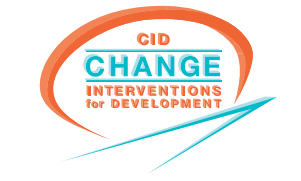Reaching a destination requires a clear roadmap that would ensure the pathway to goals and objectives.
Caby Verzosa, Managing Director of Change Interventions for Development discusses the process of communication to introduce social change.
Presentation at the seminar ‘Frontiers in Leading Change’ held May 27-28, 2015 in Berlin, Germany. Sponsored by the World Bank Group’s Leadership, Learning and Innovation and GIZ’s Academy for International Cooperation.
Conducting online class for the University of the Philippines College of Mass Communication, with master level students from the public and private sectors, academe, and civil society organizations. Class directed by Leonora Aquino Gonzales, professorial lecturer at the Department of Communication Research.
Another class in communication theory expressing their gratitude for Caby Verzosa’s lecture.
CID Strategic Communication Learning Program
Background
CID’s Learning Program focuses on four core competencies that enhance the effectiveness of change agents and reform teams in mobilizing people to embrace change.
At the basic level, change agents can improve communication skills. This includes the ability to inform and persuade and to conduct communication research to gain a deeper understanding of stakeholder attitudes, perceptions and behaviors. Of special interest is gaining expertise in working with the media, and in using social media to reach specific groups.
At the next level, change agents aim to build effective relationships – whether these interactions are at the level of individuals, small groups, or large constituencies. Communication competencies include listening; intercultural communication; group interaction; and leadership communication.
The next two types of communication competencies focus on using communication to drive change. Using communication to enhance program success includes the following competencies: communication strategy development; communication planning process; the development of advocacy campaigns, behavior change interventions, or social marketing programs.
A new frontier of work, multi-stakeholder engagement, utilizes the intertexture of two disciplines – strategic communication and negotiation/conflict management. Negotiation techniques emphasize key concepts often overlooked in more traditional, ‘deal-based’ negotiation training. It complements the mobilization and coalition-building framework central to the discipline of strategic communication. Thus, change agents and reform teams gain a deeper understanding of the motivations of actors/stakeholders at the center of the conflict and teaches them the skill of creating the ‘space’ to co-create options that can lead to a durable agreement.
Evaluation
A standard evaluation of course content, process, and applicability to their work context has been done for all courses and benchmarked across other courses offered within a single institution.
In addition, for the distance learning course ‘ Strategic Communication for Development Projects’ conducted in 11 Francophone African countries and 9 Anglophone African countries, an extensive evaluation was conducted 1-3 weeks post-training and 4-6 months post-training. (Verzosa, Cecilia Cabanero 2002. Determinants of Behavioral Intention in Developing Country Organizations).
These various communication learning programs have reached some 8,500 participants.
Projects
Sharing Knowledge, Experience, Expertise
In various fora, using multi-media tools, shared real world experience of change interventions in developing countries. Recent work includes a senior management retreat for a regional office in the Middle East for a multilateral institution where we discussed conditions for success as well as continuing challenges in public sector reform.
Designing Online, Digital Products and Services
Designing Online, Digital Products and Services Developed, facilitated, and monitored results of various online learning programs/products and services. These include:
People, Politics and Change: Building Communication Capacity forGovernance Reform by Cecilia Cabanero-Verzosa and Helen R. Garcia.
Based on five years of workshops, seminars, global dialogues, conducted for developing country reformers and change agents worldwide, a 286 MB transmedia material was designed for reformers and change agents. This contained downloadable training videos, videotaped interviews with global leaders, and workshop session designs with teaching cases, technical briefs, and decision making templates and worksheets.
Building Commitment to Reform through Strategic Communication by Cecilia Cabanero-Verzosa and Helen R. Garcia.
Delivered online courses on Strategic Communication, Conflict Management, Stakeholder Engagement to country teams in Asia, Africa, and the Middle East. Course materials were captured in a monograph available online and in print.
Determinants of Behavioral Intention in Developing Country Organizations by Cecilia Cabanero-Verzosa.
A distance learning course delivered to some 1,000 participants from government, civil society organizations, and donor agencies based in Africa, Eastern Europe and Central Asia, and Latin America provided evaluation metrics for assessing utility of the “Five Communication Management Decision tool” for communication strategy development. This tool was subsequently transformed into an online product and used in both classroom - based courses and online coaching.
Conducting Workshops, Seminars
Designed customized learning programs focused on change interventions and multi-stakeholder engagement in reforms across several sectors, including:
Public sector reform
Public procurement
Public-Private partnerships
Social Protection
Judicial reform
Health, education, nutrition
Women’s education and gender
Urban development
Biodiversity, conservation, environment






